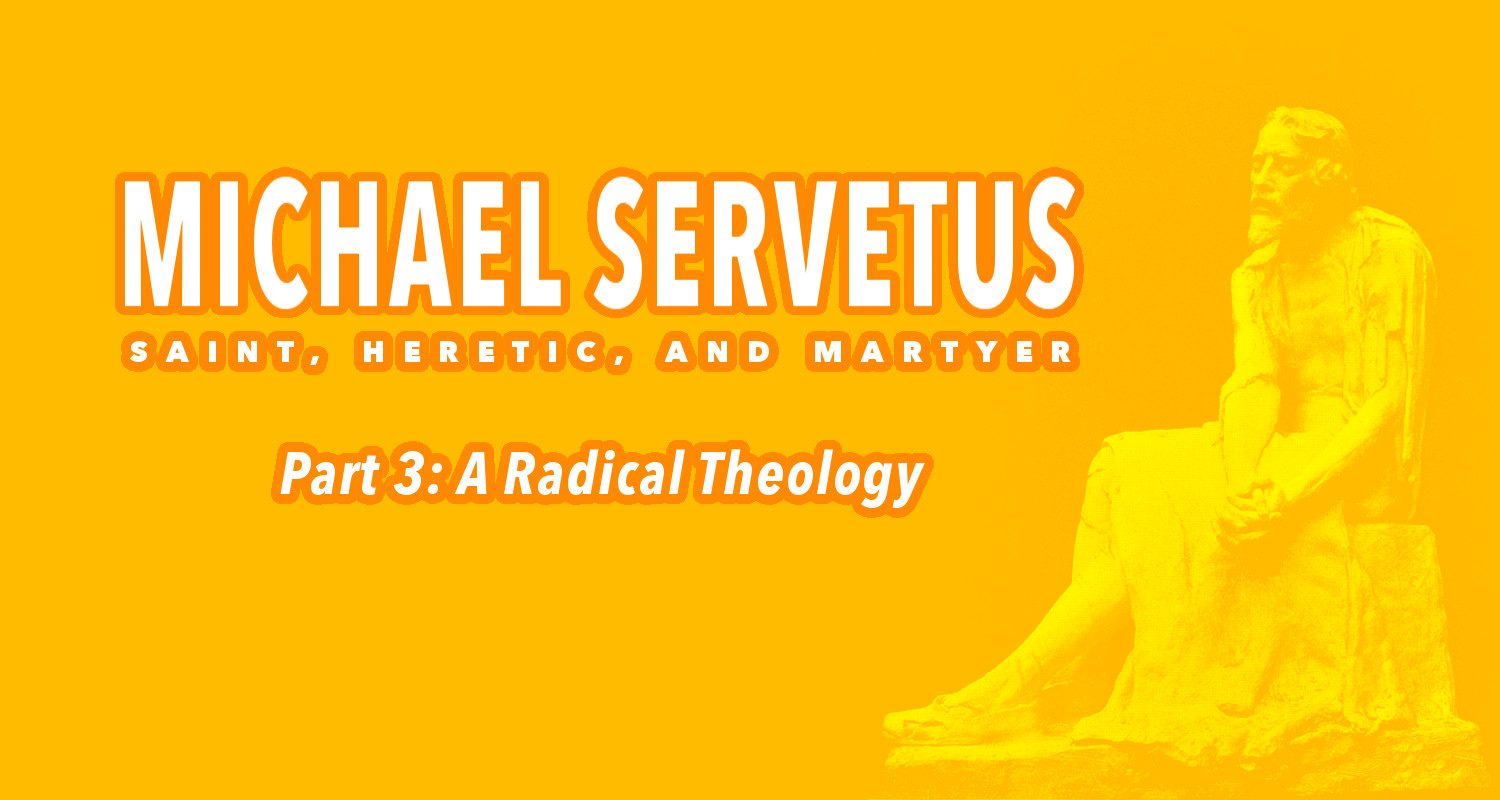
Michael Servetus' Radical Theology
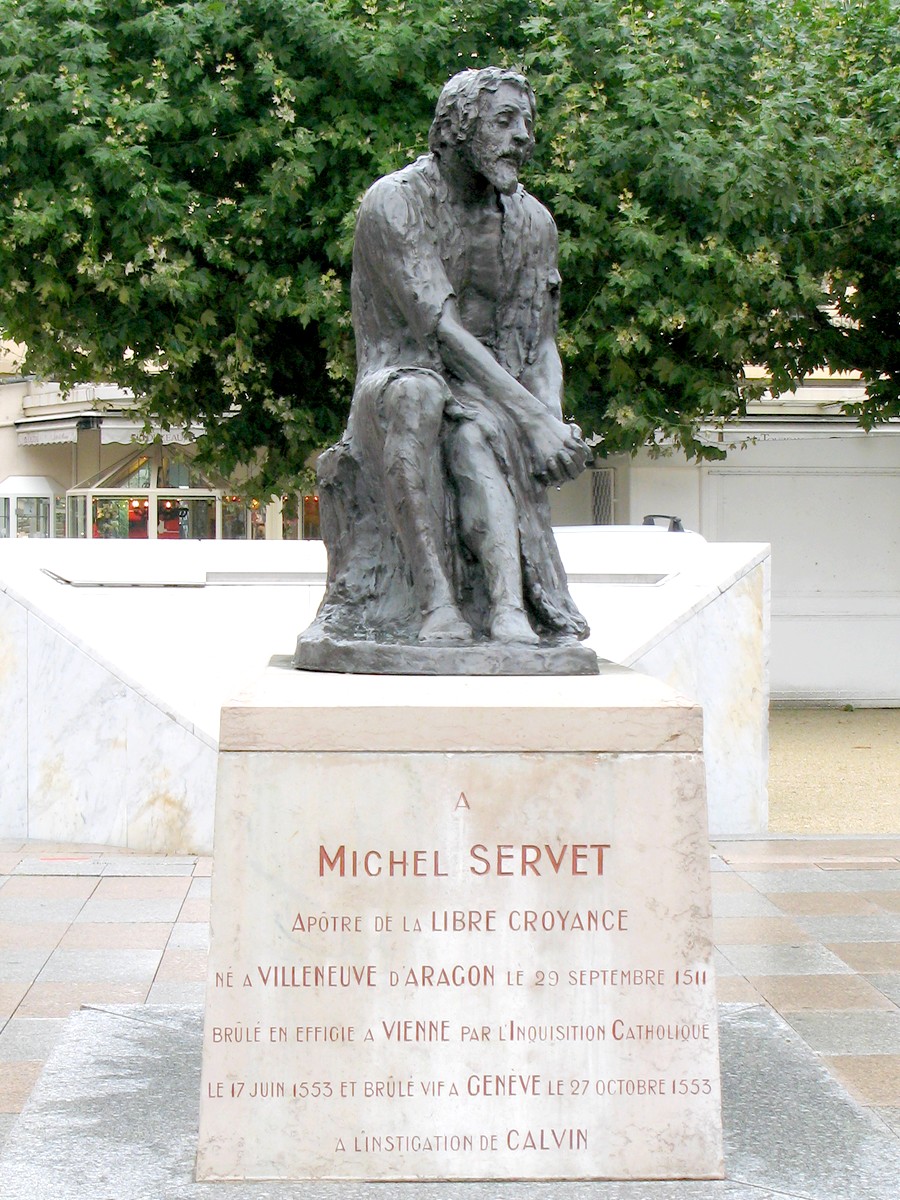 Michael Servetus was a Spaniard "born about 1511 in Villanueva [de Sigena], 160 miles upriver from Zaragoza, Servetus was [John] Calvin's close contemporary" [1]
Michael Servetus was a Spaniard "born about 1511 in Villanueva [de Sigena], 160 miles upriver from Zaragoza, Servetus was [John] Calvin's close contemporary" [1]
Servetus' radical theology did not originate from an abnormally carnal nature. Servetus had an impeccably moral character, and perhaps it was Servetus' saintly ethic that drove his passion for theology, and also drove his opponents to hate him even more so. Bernard Cottret provides this moving report of Servetus' saintly life that is illuminates Servetus' internal drive:
"Far from being a happy bachelor—are bachelors ever happy?—he led an irreproachable life, an accident in his youth having freed him finally from those urgings of the flesh that men are subject to. Not the least lewdness, no fornication, no double life, no mistresses in his closet, Servetus offered nothing, absolutely nothing, for his opponents to lay hold of -- he was totally irreproachable. In the midst of so many Christians who believed or thought they believed, his faith was indisputable, his motives were pure; he was, in short, a holy man who was mistaken in his beliefs. A heretic irritates all the more if he is virtuous." [2]
Bernard Cottret argues that Servetus' radical theology may have originated from the prevalence of all three Abrahamic religions in the place where he lived in Spain, and his desire to have a unified faith with them all. "In Servetus the three great monotheistic religions that had colonized the Iberian Peninsula, Judaism, Christianity and Islam, coexisted." [3] Cottret speculates "Was Servetus a Jew? He always denied it. But the evidence suggests that he possessed a knowledge of Judaism that surpassed that of the best Christian scholars." [4] Like the Ebionites, Nazarenes and other Judaizers, Servetus developed a Christian theology that was closer to Judaism, and he was willing to abandon any theology that was incompatible with Judaism. "For Servetus 'one basis of determining the validity of a Christian view was whether or not Jewish sources would have accepted that point of dogma.'" [5] Servetus was even willing to criticize the Nicene and Chalcedon creeds where were the universal standard for orthodoxy. Cottret says that "One God in three persons? This belief was unnecessary, according to Servetus, who deplored the fact that this doctrine divided Christianity from the other monotheisms, Judaism and Islam." [6]
On the Errors of the Trinity (1531)
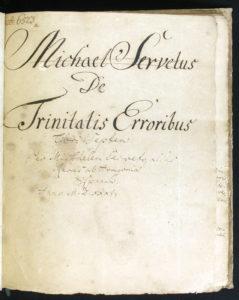 Michael Servetus wrote many books, but it was his theological writings that resulted in his universal condemnation and ultimately his execution. Two books are particularly notable, the first is Servetus' De Trinitatis erroribus libri septem (On the Errors of the Trinity: seven books) published in 1531, which was received with severe criticism. The book is frequently labeled as 'antitrinitarian' and Servetus is frequently said to reject the Trinity, but I doubt many Christians would be able to identify Servetus' specific errors in this book. Even the english translations of the Latin book's title is misleading, suggesting a radical antitrinitarinism that departs from orthodox in toto. For instance, Bernard Cottret provides two sample quotations from Servetus' On the Errors of the Trinity (or Concerning Trinitarian Errors):
Michael Servetus wrote many books, but it was his theological writings that resulted in his universal condemnation and ultimately his execution. Two books are particularly notable, the first is Servetus' De Trinitatis erroribus libri septem (On the Errors of the Trinity: seven books) published in 1531, which was received with severe criticism. The book is frequently labeled as 'antitrinitarian' and Servetus is frequently said to reject the Trinity, but I doubt many Christians would be able to identify Servetus' specific errors in this book. Even the english translations of the Latin book's title is misleading, suggesting a radical antitrinitarinism that departs from orthodox in toto. For instance, Bernard Cottret provides two sample quotations from Servetus' On the Errors of the Trinity (or Concerning Trinitarian Errors):
"I do not separate Christ from God any more than a voice from the speaker or a ray from the sun. . . . He and the Father are one as the ray and the sun are one light." [7] - Michael Servetus
"Christ walketh upon the wings of the wind and sitteth upon the circle of the earth. He measureth the heavens with a span and the waters of the sea in his hand." [8] - Michael Servetus
Dialogues on the Trinity (1532)
Not long after On the Errors of the Trinity was published Johannes Oecolampadius compelled Servetus to recant his errors, and Martin Bucer publicly refuted Servetus' work too (likely upon Oecolampadius's request). Prior to publishing it, Servetus had lived in with Johannes Oecolampadius for about ten months. A year later in 1532, Servetus was compelled to retract On the Errors of the Trinity, and he did so through another publication Dialogorum de trinitate libri duo (Dialogues on the Trinity: two books); some scholars describe this new book as a compulsory retraction of his previous immature work (On the Errors of the Trinity) but others scholars describe it as an attempt to address criticism of his original book. I do not have access to english translations of either works to make a judgment. Regardless, the result of Servetus two books on the Trinity may be understood as one work in two parts. Servetus was publicly opposed and confronted by the famous reformers of the 1530's, and now the Holy Inquisition was aware of his radical theology, and so Servetus could not return to Spain. Servetus decided to go on the run and remain undercover.
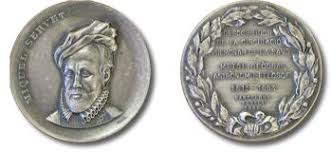 In 1533, Michael Servetus disguised himself with the pseudonym "Michel de Villeneuve" [9] and fled to study medicine, mathematics and other subjects at a university in Paris. Servetus was a genius who mastered many subjects in addition to theology and wrote many books. "Besides medicine and the pharmacopoeia, Servetus also cultivated geography and astrology. Insatiably curious about everything, he studied the origin of syphilis, the digestion of food, and the pulmonary circulation of the blood." [10] Many today credit Servetus for his remarkable discovery of Pulmonary circulation that pre-dated William Harvey (1578–1657). It is also at this time in Paris that Servetus likely came in contact with John Calvin for the first time.
In 1533, Michael Servetus disguised himself with the pseudonym "Michel de Villeneuve" [9] and fled to study medicine, mathematics and other subjects at a university in Paris. Servetus was a genius who mastered many subjects in addition to theology and wrote many books. "Besides medicine and the pharmacopoeia, Servetus also cultivated geography and astrology. Insatiably curious about everything, he studied the origin of syphilis, the digestion of food, and the pulmonary circulation of the blood." [10] Many today credit Servetus for his remarkable discovery of Pulmonary circulation that pre-dated William Harvey (1578–1657). It is also at this time in Paris that Servetus likely came in contact with John Calvin for the first time.
The Restoration of Christianity (1553)
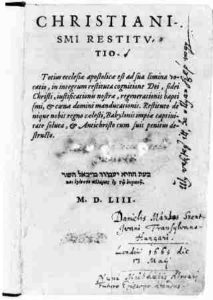 Michael Servetus' most important and influential work was his Christianismi Restitutio (The Restoration of Christianity); this second notable book was published in 1553, long after Servetus had completed writing it. The title Restitutio appears to be a parody of John Calvin's Institutio, indicating that Restitutio was a response to the first edition of John Calvin's Institutes of the Christian Religion (1536), and was in response to their correspondence via letters. Servetus provided a manuscript copy of his The Restoration of Christianity when they finally met face-to-face in 1546 (7 years before it was published). When Servetus finally managed to officially publish his Restitutio in 1553, it caused a cascade of events that lead to his execution.
Michael Servetus' most important and influential work was his Christianismi Restitutio (The Restoration of Christianity); this second notable book was published in 1553, long after Servetus had completed writing it. The title Restitutio appears to be a parody of John Calvin's Institutio, indicating that Restitutio was a response to the first edition of John Calvin's Institutes of the Christian Religion (1536), and was in response to their correspondence via letters. Servetus provided a manuscript copy of his The Restoration of Christianity when they finally met face-to-face in 1546 (7 years before it was published). When Servetus finally managed to officially publish his Restitutio in 1553, it caused a cascade of events that lead to his execution.
The word restoration is the operative word in The Restoration of Christianity, because Servetus believed that "the 'restoration' of authentic Christianity, corrupted since the Council of Nicea in the fourth century, required a constant confrontation with the rabbinical sources that preceded the New Testament." [11] Servetus' radical theology, was a radical orthodoxy, and a radical return to pre-Constantinian Christianity, and it is not surprising that Servetus was executed similar to the Anabaptists and others who criticized Constantinian Christianity.
Servetus' theology did not receive a fair assessment from leading Protestants and Catholics alike. Bernard Cottret provides a helpful summary of Servetus' Restoration of Christianity written in the personae of Servetus' critics: "The Trinity? It was a mere sophistry, invented by the Council of Nicea in 325. The two natures of the Savior, defined by the Council of Chalcedon in 451? Servetus accepted the formula, but when he explained it himself, his readers tore their hair." [12] And, "It was above all for his ideas about Christ that Servetus was reproached. This Spaniard was completely, abominably heretical; his obstinacy, his nimble mind, and his feelings for a retort never abandoned him. He had an answer for everything, and he bothered and disconcerted people." [13]
Bruce Gordon summarized The Restoration of Christianity this way:
"Among its offenses were a denial of original sin and a bizarre and hardly comprehensible view of the Trinity. Christ, for Servetus, was not the eternal Son of God but a form taken by God to come to earth. And that was only the beginning. Virtually everything he wrote would have offended Protestants and Catholics alike. Servetus believed that the devil created the papacy and that the end of the world would arrive when the Archangel Michael brought final deliverance, which the Spaniard held would be some time towards the end of the sixteenth century." [14]
Servetus was driven by an apocalyptic view of the world, and it caused him to act carelessly in his letters and publications, as well as in his personal encounters with the leading Protestant and Catholic authorities of his time, and his obsession drove him into conflicts in Spain and France that almost killed him multiple times before he was finally executed in Geneva.
In this Part 3 of the Michael Servetus: Saint, Heretic, and Martyr series, I described the origin of Michael Servetus' radical theology. In Part 2, I described Michael Servetus as "A Person Condemned by the Whole World" and in Part 1, I described Michael Servetus' execution in Geneva where he was "Burned Alive at the Stake." Check back soon for Part 4!
- Michael Servetus: Saint, Heretic, and Martyr (Part 1: Burned Alive at the Stake)
- Michael Servetus: Saint, Heretic, and Martyr (Part 2: A Person Condemned by the Whole World)
- Michael Servetus: Saint, Heretic and Martyr (Part 3: A Radical Theology)
- Michael Servetus: Saint, Heretic and Martyr (Part 4: A Twenty Year Fight to the Death with John Calvin)
- Michael Servetus: Saint, Heretic, and Martyr (Part 5: A Defense of John Calvin and the Calvinists)
Sources:
1. Bernard Cottret, Calvin: A Biography, T & T Clark: 2000, Grand Rapids. Print. p. 213.
2. Cottret. Ibid. p. 220.
3. Cottret. Ibid. p. 214.
4. Cottret. Ibid. p. 213.
5. Cottret. Ibid. p. 213.
6. Cottret. Ibid. p. 213.
7. Cottret. Ibid. p. 213.
8. Cottret. Ibid. p. 213.
9. Cottret. Ibid. p. 219.
10. Cottret. Ibid. p. 215.
11. Cottret. Ibid. p. 213-4.
12. Cottret. Ibid. p. 214.
13. Cottret. Ibid. p. 214.
14. Bruce Gordon, Calvin, Yale University Press: 2009, Great Britton, Print. p. 218
15. Header contains Image: "Michael Servetus in prison, by Clotilde Roch. Monument in Annemasse, France" (source: wikipedia)
16. Image. Statue of Michael Servetus near Geneva in the place de la Mairie d'Annemasse: (source: wikipedia).
17. Image. Silver medal servetus: (source: calvin.edu).
18. Image. Errors of the Trinity image: (source: galileo exhibit)
19. Image. Restoration of Christianity: (source: wikipedia)
Related: Bernard Cottret, Bruce Gordon, Christianismi Restitutio, De Trinitatis erroribus, Dialogorum de trinitate, Dialogues on the Trinity, Johannes Oecolampadius, John Calvin, Martin Bucer, Michael Servetus, Nicene Creed, On The Errors of the Trinity, Pulmonary circulation, Restorationism, ServetusSeries, The Restoration of Christianity



February 1st, 2021 - 13:08
The trinity doctrine is a lie that has been institutionalized by religious people. Biblically it has no logical point. Mathematically it is untrue. The Bible overly explains that there is one God and that one God is completely in Jesus Christ, as a person. There are no other persons that have ever been manifested, that God ever endorsed as being the Christ of God. trinitarianism is confusion. Servetus got it right and dared to confess it. The murderous and misinformed killed him, as is natural custom. Look at all of the biblical martys of truth: it was always the blind to truth that executed the truth tellers.
February 1st, 2021 - 13:10
The trinity doctrine is a lie that has been institutionalized by religious people. Biblically it has no logical point. Mathematically it is untrue. The Bible overly explains that there is one God and that one God is completely in Jesus Christ, as a person. There are no other persons that have ever been manifested, that God ever endorsed as being the Christ of God. trinitarianism is confusion. Servetus got it right and dared to confess it. The murderous and misinformed killed him, as is natural custom. Look at all of the biblical martys of truth: it was always the blind to truth that executed the truth tellers. Even in the current KJV, there appears transliterations and commas that were interjected to try to advance the teaching of the trinity, but still fail to change the truth of God’s Word, that all is contained in Jesus Christ.
October 16th, 2022 - 18:47
You are right, in Christ is the fullness of the Godhead bodily. Colossians 2:9